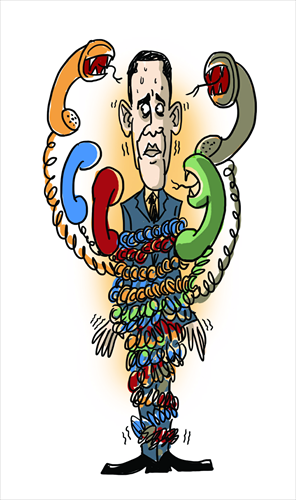HOME >> OP-ED
US spy scandal puts France in tight spot
By Charles Gray Source:Global Times Published: 2013-10-27 17:53:01

Illustration: Liu Rui/GT
The current controversy between France and the US over the accusations of large-scale intelligence gathering by the NSA may at first glance seem to be similar to earlier claims that US intelligence agencies had targeted the French government.
However, these current revelations are far more serious, and may in fact prove to be more damaging to the US' reputation and interests than the NSA's previous activities.
The earlier accusations regarding US intelligence activities involved the targeting of French government agencies, most notably the foreign ministry. Although these actions have strained the relationship between the US and France, it is unlikely that anyone in the French government was overly surprised at the mere fact of this program's existence.
Nonetheless, the most recent revelations represent a far more serious challenge to the France-US relationship. By targeting civilian communications, the US has directly challenged France's responsibility to protect its own citizens.
The size of this program cannot be overestimated. Glenn Greenwald, working from the files provided by Edward Snowden, has shown that over a period of 30 days, over 70 million data intercepts were made involving French citizens.
The intercepted information also included the meta-data needed to determine what other individuals or groups the target had communicated with. Furthermore, additional leaked files indicate that other European nations have been targeted by similar programs.
There are several issues that may result in serious damage to the US' ability to work with the French government.
The first is the anger of the French people. Whatever the justifications provided by Washington, the view is that these programs represent a wholesale invasion of privacy on the part of the NSA.
The sheer number of intercepts makes it difficult to believe that the NSA is only targeting confirmed terrorists, as opposed to casting a vast net in hopes of finding information that may be of use to the US. Even if the French authorities were willing to let this affair drop, public anger may not allow it to do so.
The second issue will be the difficulty in convincing the French government that this surveillance has ceased.
After all, the recent history of the US government has been one of denials of programs that were later proven to exist. Promises to end further programs of this nature or to coordinate with the French government would likely be met with skepticism.
Finally, there is the question of what this intelligence is being used for.
Such a widespread program has certainly obtained proprietary commercial information, and French and European companies may worry that they will find their own trade secrets used against them.
Equally, organizations that take up causes the US is opposed to may fear that their messages are being monitored by the US and could subsequently be made available to their enemies.
Not only would that damage dissident and whistle-blower groups, it might also result in confidential informants becoming reluctant to provide information to them for fear of exposure.
That last fact may be the one that causes the most long-term damage to the two nations' political relationship.
To fail to respond firmly to such intrusion, even if it is only electronic upon the sovereign territory of France, would demonstrate that Paris was either unable or unwilling to take action to protect its own people. That in turn would drastically damage the current government's legitimacy in the eyes of its own citizens.
For these reasons, France cannot afford to accept anything other than both an apology and a guarantee that this activity will not be repeated in the future. However, as I mentioned above, US claims that the NSA intelligence gathering in France has ceased will no doubt be met with skepticism.
Intelligence operations aimed at governments are an understood, if disliked, part of international relations. Nevertheless, by expanding these operations to the civilian population of its allies, the US may have done serious and long-term damage to its relationship with those same allies.
The author is a freelance writer based in Corona, California. charlesgray109@gmail.com
Posted in: Viewpoint